POJAM IZDAJE U JUGOSLAVIJI - IZMEĐU PROIZVOLJNOSTI,
REALIZACIJE I NAUČNE ANALIZE
THE CONCEPT OF TREASON IN YUGOSLAVIA - BETWEEN SUPPOSITIONS, RELATIVISM AND SCIENTIFIC ANALYSIS
Author(s): Branko PetranovićSubject(s): Political history, Recent History (1900 till today), WW II and following years (1940 - 1949), Post-War period (1950 - 1989)
Published by: Institut za savremenu istoriju, Beograd
Keywords: Kingdom of Yugoslavia; treason; critical analysis; war period; revolution; postwar period; politics and ideology; socialism; collaborationist; chetnik;
Summary/Abstract: The author has made a critical analysis of the concept of »treason« in the Kingdom of Serbs, Croats and Slovenians i.e. Yugoslavia during the war and revolution and in post-war Yugoslavia (1945 - 1993). The analysis is not based on legal terms or qualifications of specific activities or the definition of this concept according to criminal legislation or jurisprudence in general but on historical explanations of the concept of treason in its concrete form and in specific historical circumstances. The concept of treason in Yugoslavia was made relative in the political and psychological sense as a result of intensified national conflicts. What was treason for one side, meant serving one's people to the other. National and class conflicts gave different meanings to the activities mentioned as »traitorous«. The author describes communists both as Yugoslavia is opponents (1925 - 1935) and as leaders of the social revolution. Collaborationist (1941- 1945) were given less attention in the analysis than the other, chetnik, rival movement. From the standpoint of a victorious revolution (as a forcible change of government in the circumstances of the Second World War) the chetnik movement is the main adversary of the national liberation movement. In the course of the War from 1941 to 1945 and especially once it was ended the winning side gave an extensive interpretation of the category of treason. A few years later, acceptance of the Cominform Resolution (»cominformism«) was branded as »national treason«. Particular attention in the analysis was given to the concept of treason in the process of disintegration of the state, a time of general turmoil, disparity and tribal strife in a country partitioned by insurmountable walls of hatred. Yugoslavia had been disintegrating for years both as a physical and political idea. The downfall of the ideology of Yugoslav socialism came along with the break of the »socialist empire «,the USSR and the Soviet federation as a united subject.
Journal: Istorija 20. veka
- Issue Year: 1993
- Issue No: 1+2
- Page Range: 207-216
- Page Count: 10
- Language: Serbian

